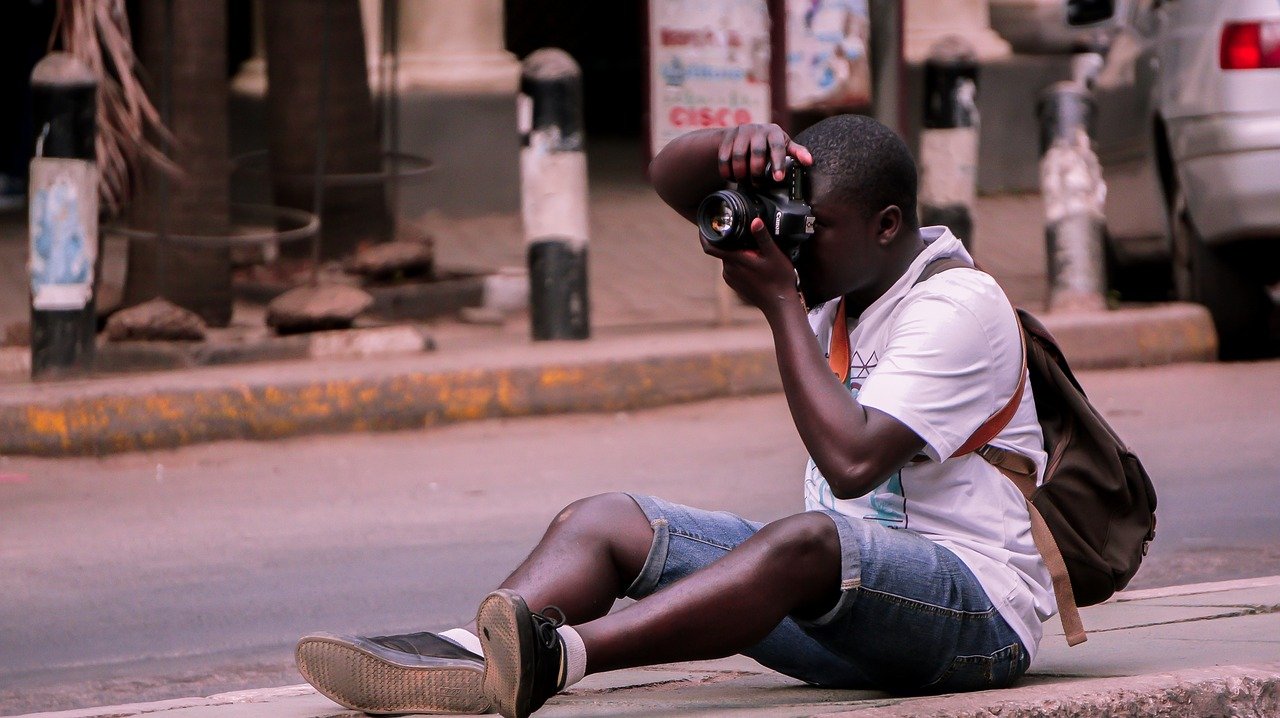Image Credit: Ninastock on Pixabay
In this blog post we’ll look at vocabulary and expressions that you can use to describe people in Swahili.
Huyu ni rafiki yangu. This is my friend.
Let’s start with phrases you can use to introduce people and say how you know each other.
- Huyu ni rafiki yangu.
This is my friend. - Tunafanya kazi pamoja.
We work together.
- Tulikuwa tukifanya kazi pamoja.
We used to work together. - Tunaenda shule pamoja.
We go to school together. - Tulienda shule pamoja.
We went to school together. - Mlikutana wapi?
Where did you meet? - Tulikutana chuo kikuu/kwenye karamu/kwenye baa/kwenye duka la kahawa.
We met at university/at a party/at a bar/at a coffee shop. - Tuna marafiki wa pande zote.
We have mutual friends. - Tumefahamiana kwa miaka mingi.
We’ve known each other for years. - Tulikua pamoja.
We grew up together. - Sisi ni majirani.
We’re neighbors.
Yeye ni mrefu. He’s tall.
If you’re telling someone about a friend, you may want to describe him or her. Let’s start with physical characteristics.
- Je, anafananaje?
What does he/she look like? - Yeye ni mrefu.
He’s/She’s tall. - Yeye ni mfupi.
He’s/She’s short. - Anaoneka ana sura mzuri.
He’s/She’s good looking. - Yeye ni mwembamba.
He’s/She’s thin. - Yeye ni mnene.
He’s/She’s fat. - Yeye ni mchanga.
He’s/She’s young. - Yeye ni mzee.
He’s/She’s old. - Yeye ameunga mwili vyema.
He’s/She’s in shape. He’s in shape. - Mwili wake hauko vyema.
He’s/She’s out of shape.
Ana nywele ndefu. She has long hair.
People have all sorts of different mitindo ya nywele hairstyles, so that’s a common way to describe people.
- Ana nywele fupi.
He/She has short hair. - Ana nywele ndefu.
He/She has long hair. - Ana nywele zilizonyooka.
He/She has straight hair. - Ana nywele zilizopinda.
He/She has curly hair. - Ana nywele katikati ya rangi ya kahaiwa.
He/She has light brown hair. - Ana nywele nyekundu / nywele za kahawia / mvi.
He/She has red hair/brown hair/gray hair. - Ana nywele za almaria.
She has braids. - Ana upara.
He’s bald. - Ana masharubu/ndevu.
He has a mustache/beard.
Utu: Personalities
Sometimes we describe people we know by talking about their personality types.
- Je, ana utu wa aina gani?
What kind of personality does he/she have? - Ana aibu.
He’s/She’s shy. - Ni mcheshi
He’s/She’s funny. - Ni wa kutililia mambo maanani.
He’s/She’s serious. - Ana wasiwasi.
He’s/She’s anxious. - Ni mpole hana maneno.
He’s/She’s relaxed/quiet. - Yeye ni mtu mwenye furaha.
He’s/She’s a happy person. - Yeye ni mtu asiye na furaha.
He’s/She’s an unhappy person. - Amejipanga sana.
He’s/She’s very organized. - Yeye ni mtu mwenye matumaini.
He’s/She’s an optimist. - Yeye ni mtu asiye na matumaini.
He’s/She’s a pessimist.
Nampenda! I like her/him!
If you like someone, sifa chanya za utu positive personality traits are probably something you would use to describe them.
- Ana utu mkubwa.
He/She has a great personality. - Nampenda sana.
I like him/her a lot. - Yeye ni rafiki mzuri.
He/She is a good friend. - Anavutia sana.
He’s/She’s very interesting. - Ana furaha sana.
He’s/She’s very cheerful. - Daima yuko katika hali nzuri.
He’s/She’s always in a good mood. - Yeye ni mzuri sana.
He’s/She’s very friendly/nice. - Yeye ni rafiki mwaminifu.
He’s/She’s a loyal friend. - Anawafikiria wengine.
She’s thoughtful of others. - Yeye ni muwazi.
He’s/She’s open-minded. - Yeye ni mnyenyekevu.
He’s/She’s modest. - Anaelewana na kila mtu.
He/She gets along with everyone.
Simpendi! I don’t like him/her!
On the other hand, if you don’t like someone, sifa mbaya za utu negative personality traits are what you’d use to describe them.
- Simpendi.
I don’t like him/her. - Ananiudhi.
He/She annoys me. - Yeye huwa katika hali mbaya kila wakati.
He’s/She’s always in a bad mood. - Hana urafiki.
He’s/She’s mean/unfriendly. - Yeye ni mkaidi.
He’s/She’s stubborn. - Sio muwazi.
He’s/She’s closed-minded. - Anachosha.
He’s/She’s dull/boring. - Yeye ni mbinafsi.
He’s/She’s selfish. - Ana kiburi.
He’s/She’s arrogant. - Yeye si mwaminifu.
He’s/She’s not trustworthy. - Yeye hajali.
He’s inconsiderate. - Yeye ni mcheshi!
He’s/She’s a clown!
Yeye hutabasamu kila wakati. He/She always smiles.
We often describe people by talking about their mazoea habits.
- Yeye hutabasamu kila wakati. Hatabasamu kamwe
He/She smiles all the time. He/She never smiles. - Anacheka kila wakati. Yeye kamwe hucheka.
He/She laughs all the time. He/She never laughs. - Anafanya kazi kwa bidii sana.
He/She works very hard. - Yeye ni mvivu.
He/She’s lazy. - Analalamika sana.
He/She complains a lot. - Yeye kamwe halalamiki.
He/She never complains. - Yeye hataki kufanya chochote cha kufurahisha.
He/She never wants to do anything fun. - Yeye daima anataka kufanya kitu cha kusisimua.
He/She always wants to do something exciting. - Yeye hufanya mazoezi sana.
He/She works out a lot. - Anacheza michezo mingi ya video.
He/She plays too many video games. - Yeye hufuata sheria kila wakati.
He/She always follows the rules. - Yeye hufanya chochote anachotaka.
He/She does whatever he/she wants. - Hutoka na marafiki zake sana.
He/She goes out with his/her friends a lot. - Hupenda kukaa nyumbani.
He/She likes to stay home. - Hucheza michezo mingi.
He/She plays a lot of sports. - Husoma kila wakati.
He/She reads all the time. - Hufanya sherehe kubwa.
He/She throws great parties. - Hufanya mengi kwa marafiki zake.
He/She does a lot for his/her friends.
Ana akili kweli. She’s really smart.
People have different vipaji talents and maslahi interests, and sometimes we describe people by saying what they’re good (or not so good!) at.
- Yeye ni mwerevu.
He’s/She’s smart/intelligent. - Anavutiwa na historia/lugha/sanaa/filamu.
He’s/She’s interested in history/languages/art/movies. - Huandika/ Hunapika/ Hupaka rangi/ Huimba vizuri sana.
He/She writes/cooks/paints/sings very well. - Ana vitu vingi vya kufurahisha.
He/She has a lot of hobbies. - Anapenda wanyama.
He/She loves animals. - Anapenda kusafiri.
He/She loves to travel. - Anapenda kutumia wakati na marafiki.
He/She loves to spend time with friends. - Yeye ni mzuri katika tenisi.
He’s/She’s good at tennis. - Yeye ni mbaya katika tenisi.
He’s/She’s terrible at tennis. - Ana kipawa cha muziki.
He’s/She’s gifted musician. - Hawezi kuimba/kucheza vizuri.
He/She can’t sing/dance well. - Yeye ni mbunifu sana
He’s/She’s very creative. - Yeye si mbunifu sana.
He’s/She’s not very creative. - Ungempenda sana!
You would really like him/her!
Do you want to learn Swahili?
Check out our other posts on Swahili language, culture, and more. And if you’re looking for convenient and affordable live Swahili lessons with a real teacher, check out The Language Garage Swahili. Our lessons are given online in a virtual classroom, so it doesn’t matter where you live or work. We can come to you. And we have flexible options, with a free trial so that you can decide if there’s a fit. Check us out!





